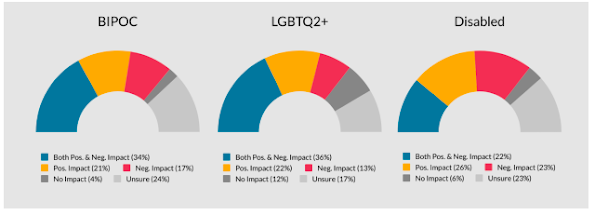I recently wrapped up an arts mentorship program at Centre A and worked with a diverse group of writers, and as a group, we explored the creative writing and publishing industry within the context of BIPOC artists. It’s good timing that the Diversity in Canadian Writing: A 2020-2021 Snapshot has been released. UBC creative writing professors Rhea Tregebov and Kevin Chong led the project and developed the survey design. The results were not surprising: the typical respondent, based on our survey data, was: female, white, in their 60s, living in Ontario, straight, cis-gendered, and able-bodied.
In our sessions, we explored how “diversity washing” has become simply producing literary texts that publishers want for mainstream, but Canadian publishing continues to lack diversity in staffing. The next generations of writers that I worked with show that there is an emergence of diverse authors, but they are still shut out by the literary gatekeepers as there is a shortage of diverse publishers, agents, and editors. In order for BIPOC writers to flourish, they need better representation in those fields to be supported.
“There needs to be more transparency when it comes to how books are promoted and advocated for, and sometimes this has less to do with literary merit and more to do with the PR machine behind the book. This leaves a lot of us out, especially when we already face systemic barriers. We need opportunities to feature our work in more meaningful ways, beyond conversations about our identity and deeper into craft. […] It’s important that these questions are addressed by the publishing industry so that we can have transparency around what needs to be done.”
- Gatekeepers – Those in positions of power in the sector need to be more diverse, both within publishing houses and in affiliated organizations such as reviewing outlets, festival and prize administration, literary agencies and funding institutions, by creating concrete, transparent and measurable goals around their makeup
- Smaller Presses – Create greater systemic support for them which often are key in recognizing and promoting marginalized authors.
- Training - Mandate EDI training for staff, as well as create a budget and established procedure for employment of sensitivity readers among publishers.
- No More Identity Labels – Titles by marginalized authors should be promoted, evaluated and featured in nuanced, complex and meaningful ways beyond simple identity labels. Organizations, reviewers and readers should recognize that non-dominant culture content is not of limited interest and that publications are not limited by simple identity labels. Content should not have to be trauma-generated or otherwise identity-specific in order for authors to be given a platform.
- Funding – Create funding structures for disabled writers to pay upfront for the support needed to fully participate in events.
- Prizes – Carefully review the creation of new prizes, their mandates and their selection processes to ensure better inclusivity. Moreover, residency and grant opportunities that set an arbitrary age limit for eligibility should be removed.
I’m heartened by the work that the authors of this report and I’m optimistic that it puts the lens of EDI squarely focused on the current landscape of Canadian publishing. I’m often invited to government book awards and grant juries for diversity, consult on EDI by book publishers or join EDI committees. While I’m happy to participate and make a difference, I feel that my role is really at end of the conversation, to ensure representation, but not at the beginning, such as systemic change. It’s about time that EDI is integrated so that box-ticking exercises don’t need to be left at the end, as an afterthought. When I ended my final session of the Arts Writing Mentorship Program, I was heartened that participants understood that they were the next generation of the publishing industry, whether they are writers or acquisitions editors – and had a responsibility to instill change.

